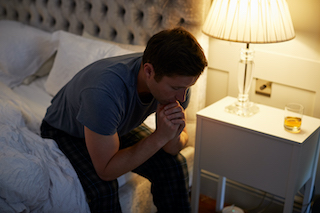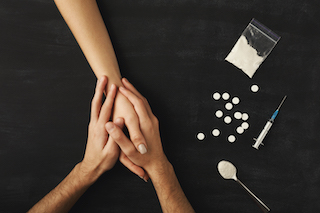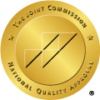A drug or alcohol relapse can be emotionally and financially devastating. It can also be deadly. Relapse or recurrence is when an individual begins to use substances after a period of sobriety or abstinence. Because substance use disorders are chronic (meaning recurring), the National Institute on Drug Abuse estimates that 40 to 60 percent of individuals will experience a recurrence. A relapse doesn’t need to occur. Some of the best tools to prevent relapse are understanding how and why a relapse can happen, developing a plan to implement if the urge to relapse occurs, and developing recovery supports before using substances.
Relapse Prevention


Recovery
Relapse Prevention
Relapse does not happen overnight, and using a substance is the last step of the relapse process. It is vital to identify warning signs and triggers early on. Planning ahead for challenging times by identifying coping strategies can prove to be helpful and useful. In recovery, it is essential to take each day one at a time, incorporate relaxation into your routine, be honest about urges to use if you have them, and distract yourself with fun and healthy activities. There are three stages of relapse: emotional, mental, and physical.
Emotional Relapse
Your path to recovery is waiting
and we’re here to help.
Our admissions specialist are available 24/7 to listen to your story
and get you started with next steps.
Why call us?
For many, emotions are the trigger for harmful behavior. When emotionally relapsing, using substances may not even be a thought. In fact, it may just be a build-up of uncomfortable feelings, unproductive behaviors, and stresses. Healthy coping skills and actions may become harder to implement. Going to meetings or therapy may be difficult, and you feel isolated and disconnected. You may even think “if I’m not using alcohol or drugs, why does my emotional state even matter?” It matters because picking up a substance again can happen very quickly. Being able to spot and recognize your triggers is how you may prevent using again.
SIGNS OF EMOTIONAL RELAPSE
- Depression
- Anxiety
- Mood Swings
- Anger
BEHAVIORAL SIGNS OF EMOTIONAL RELAPSE
- Isolation
- Breaking Routine
- Trouble Sleeping
- Refusing help
If you or those around start seeing these signs, it’s a good idea to engage in self-care addressing your emotional, physical, and mental needs. It’s helpful to attend meetings, continue or start therapy, continue compliance with medications, go to the gym, have coffee with a friend or reconnect with your treatment alumni network. Most important is to be open with your feelings, many people in recovery have gone through struggles, and it is possible to maintain sobriety.
Mental Relapse
During the mental phase of relapse, it is very easy to begin rationalizing unhealthy behaviors. For example, not going to a meeting because you’re tired and will make it up the next day. When the next day comes, the cycle starts again, and soon you may think you don’t even need support or meetings because you’ve been sober a certain length of time. Most people feel conflicted when this is happening, especially when they have the urge to use again and value what they have gained in recovery. Some warning signs include:
- Thinking about one’s previous lifestyle where drugs and alcohol were involved in a favorable light
- Planning a relapse
- Getting involved with old friends who still use
- Lying
- Downplaying consequences of previous actions
Physical Relapse
When one returns to using substances, it is often because the emotional and mental relapses went unchecked, and using again became appealing or viewed as a solution to how one feels. There is a domino effect, meaning emotions unchecked, leads to thoughts unchecked, and finally leads to drinking or using drugs. The best way to prevent picking up a substance is to catch yourself in an emotional or mental relapse and then implement your coping strategies.
Physical relapse does occur, yet it’s not always inevitable. Using the skills you learned in treatment and through other support systems, you can make it through difficult times and remain sober and drug-free.
Strategies to Prevent Relapse
By taking proactive measures, it’s possible to avoid falling into the trap of a relapse. Substance abuse treatment lays the foundation for applying the following strategies to prevent relapse:
- Practice self-care
- Get professional help (i.e., cognitive therapy and substance abuse counseling)
- Quantify the reasons you quit initially (rebuilding your life, getting healthy, repairing relationships)
- Develop a sound support system (friends, family, drug or alcohol recovery programs)
- Identify alternative means to have fun and enjoy life.
- Create a prevention plan
When to Get Help to Prevent Relapse
There is no set timeline to get help when you are struggling. When old feelings and desires to use return, voice those urges within your support system.
Relapse Triggers
Certain feelings and actions can motivate a relapse. This can include:
- Stress
- Poor self-care
- Feelings of isolation
- Low self-esteem
- Withdrawal symptoms
- Reminders of one’s lifestyle as a drug and alcohol user (friends or places associated with use)
Signs of Relapse
- Substance cravings
- Negative thoughts
- Exhibiting destructive behaviors
- Mood swings
Relapse Prevention Plan - Identifying Setbacks and Changing Behaviors
To develop a strong relapse prevention plan, try asking yourself some questions and then writing down the answers. Identifying specific triggers and behaviors that previously led to substance abuse can help inform your plan. If you have a mentor, sponsor, pastor, rabbi, or therapist it may be helpful to develop this plan with their help. Some questions might include:
- What does my self-care plan include?
- Who is in my support network (family, close friends, etc.) to reach out to if I have the urge to or start to use again?
- What triggers or situations led to my initial use, and what would cause me to have the desire to use again?
- What motivated me to stop using in the first place?
Start your journey to a new life. Speak with someone who can help by calling (844) 533-0356 – Free & Confidential.




